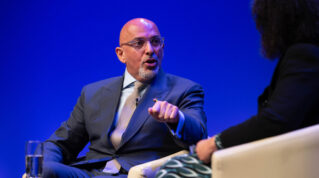Today, after two years of pandemic-related disruption and a revolution in online teaching, Nadhim Zahawi publishes his long-awaited schools white paper to the acclaim of systems thinkers and his own party. Meanwhile, teachers brace for yet another hike in workload. So how will he look back on his reforms in decades to come?
There is much Mr Zahawi could have learned from reading the reflections of his predecessors in advance of today’s big announcement. Certainly, given the current system-wide exhaustion, one might hope for a more cautious approach than a continuation of the constant change they have overseen and decades of turf wars with unions, local authorities, opposition parties and even their own civil servants.
The confident, creative profession I entered in 1983 had an abundant supply of teachers. When I retired in December 2020, it was de-skilled, de-motivated by an overbearing accountability system and suffering chronic recruitment and retention problems.
Margaret Thatcher’s appointees, Lord Baker and Ken Clarke quashed union opposition in a decade of bitter industrial disputes. The 1987 school teachers’ pay and conditions of employment act redefined teachers’ jobs into 1265 hours directed time and gave heads unlimited access to teachers’ un-directed time to “discharge their professional duties”. If Mr Zahawi softens limits on directed time, unions may well struggle to organise strikes. But it’s hard to see how he can prevent more staff joining “the great resignation”.
Traditionally, edsecs have deployed more intrusive inspection and testing to enforce policy changes. When Ken Clarke created Ofsted, he appointed Chris Woodhead, who “enjoyed nothing so much as publicly engaging in battle with the education establishment.” That confrontational tone continues to dominate the relationship between schools and the inspectorate. With a new accountability regime, will the resultant pressure on MAT leadership cascade down the hierarchy and make teaching more untenable?
Ofsted’s remit has since widened, extending ministerial dabbling beyond Lord Baker’s canon and Michael Gove’s reformed qualifications to ensuring that both content and pedagogy align with party ideology. But this has come at a cost. Ramping up targets for key stage 2 from 4.5 to 5 not only increases pressure on teachers and further narrows teaching, it also requires the DfE to re-shape the normal distribution curve which determines the proportion of grades awarded in each band.
Ofsted continues to be excluded from where it is most needed
Meanwhile, Ofsted continues to be excluded from where it is most needed: inspecting multi academy trusts. Charles Clarke’s academy programme was a targeted initiative. Lord Baker saw that Michael Gove moved too quickly. Isn’t Zahawi repeating Gove’s mistake of believing that homogenising the system will improve performance – even with his unspecified “new strong trust definition”? Completing the academisation process may fit government policy, but academies have yet to deliver uniformly better educational outcomes in a financially efficient way.
Millions were wasted when edsecs failed to put safeguards in place to prevent financial mismanagement by some MAT leaders. They failed to pre-empt excessive pay for executives and the eye-watering cost of unsuccessful start-ups. Will Zahawi’s £86m extra funding to grow and strengthen MATs be better spent?
Before he compels already successful schools to academise by 2030, Zahawi must regain fiscal control to ensure that taxpayers’ money reaches the classroom and that MATs are fully accountable to the local communities whose children stand to lose continuity of education. “Maintaining their local identity” doesn’t mean quite the same.
Since Lord Baker introduced the national curriculum, the only constant has been change. Teachers had to adapt to a business-dominated system. Now they are exhausted by a bureaucratic, unproductive workload that three of Zahawi’s predecessors and workload advisory groups have failed to eliminate. The prospect alone, let alone the reality of uncapped teaching time to make catch-up sessions financially affordable will cause many more to drop out.
Former edsec, Lord Blunkett believes that “the idea you can take either values or politics out of education is endearingly naïve.” But reading Ed Dorrell’s interviews with him and his counterparts shows they have more in common than separates them.
Unfortunately, a desire to reach across the aisle and work with the profession to plan for the long-term is common among them only by its absence. And unless today marks a sea change in that direction, Nadhim Zahawi’s plan to “irrevocably improve children’s future and the future of this country” is more likely to turn into more rueful retrospection than an enduring legacy.
















Your thoughts